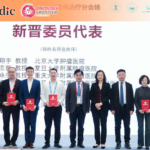
The 2024 Chinese Congress of Holistic Integrative Oncology (CCHIO) and the 4th Asian Oncology Society (AOS), hosted by the China Anti-Cancer Association (CACA), and co-organized by the Institute for Development Strategy of Holistic Integrative Medicine and Shaanxi Anti-Cancer Association, was grandly held in the ancient capital of Xi'an from November 14th to 17th. During this conference, CACA joined hands with several global academic groups in cancer prevention and treatment, including the Union for International Cancer Control (UICC), the Latin American and Caribbean Society of Medical Oncology (SLACOM), the National Comprehensive Cancer Network (NCCN), the Senologic International Society (SIS), and the London Global Cancer Week (LGCW), to hold special summits, enhancing the friendship among Chinese and international peers in cancer prevention and treatment, and is expected to promote more cooperation and exchange. Connecting hearts across continents, planning for development. On the morning of November 17th, the CHINA-AFRICA and CACA-LGCW summits attracted international experts and scholars from China, Africa, Europe, and other places, focusing on the global perspective and achievements in cancer treatment, as well as the progress and challenges in cancer research and treatment.The CHINA-AFRICA Summit
Seeks deeper Sino-African cooperation on the road to cancer control
Themed “China-Africa Collaboration for Cancer Control,” the CHINA-AFRICA Summit was chaired by Professor Chaonan Qian from Guangzhou Concord Cancer Center and Professor Zainab Shinkafi Bagudu, Chair of the Nigerian First Ladies Against Cancer Initiative.
Under the moderation of Professor Jian Zhang from the Air Force Medical University and Professor Naoufal Louati from the Moroccan Institute for Traditional Medicine, experts from China and Africa delivered academic presentations and participated in discussions.

Professor Nixon Niyonzima from the Uganda Cancer Institute highlighted the importance of strengthening cancer care and research capacity in his presentation, “Building Cancer Care and Research Capacity in Uganda.”

Professor Chaonan Qian shared insights on the development of novel anti-metastatic molecules in his presentation, showcasing advancements in anti-tumor molecular drug research.

Professor Verna Vanderpuye from Ghana’s National Radiotherapy Center reflected on the evolving landscape of cancer care in sub-Saharan Africa in her presentation, “Transitions in Cancer Care in Sub-Saharan Africa.”

Additionally, Professor Xiaoling Li from Tianjin Medical University Cancer Institute and Hospital presented findings on personalized neoantigen cancer vaccines, which have shown promising immunogenicity and tolerability in ongoing clinical trials.

In the panel discussion, experts underscored the strong historical ties and collaborative potential between China and Africa in cancer prevention and treatment. Innovations such as molecular drugs and cancer vaccines were highlighted as promising areas for breakthrough advancements, potentially transforming cancer care in both regions.
The CACA-LGCW Summit
Accelerating the Translation and Application of New Cancer Prevention and Treatment Technologies
The CACA-LGCW Summit, themed “Achievements and Challenges in Cancer Research and Treatment,” brought together leading experts to explore novel pathways in cancer care. Chaired by ProfessorKaichun Wu from the Air Force Medical University and Dr. Susannah Stanway, founder of London Global Cancer Week, the summit delved into the latest advancements in cancer diagnosis and treatment.

Moderated by Professor Meng Li from the Air Force Medical University and Professor Eduardo Cazap, Chair of SLACOM, the session featured a range of insightful presentations.

Dr. Susannah Stanway opened with “Living with Breast Cancer,” emphasizing the transformative impact of novel anti-cancer therapies on patient survival and the importance of managing breast cancer as a chronic condition.

Professor Feng Wang from Sun Yat-sen University Cancer Prevention Center shared groundbreaking work in “Clinical and Translational Research on Precision Immunotherapy for Gastric Cancer,” which has been published in top-tier international journals.

Professor Christopher Jackson from the University of Otago in New Zealand delivered a thought-provoking talk titled “Cancerology 101: What Really Matters,” urging a shift in focus toward outcomes that matter most to patients, such as quality-of-life measures and patient-reported outcomes.

Professor Yizhou Jiang from Fudan University Shanghai Cancer Center presented research on “Molecular Subtyping and Precision Treatment of Triple-Negative Breast Cancer,” featuring the globally recognized “Fudan Subtyping” system and key clinical and translational research achievements.

Professor Myrna Doumit, President of the Lebanese Order of Nurses, highlighted the critical role of oncology nurses in providing holistic care under the integrated oncology model.

Finally, Professor Lina Zhao from the Air Force Medical University introduced her work on “Establishing and Applying AI-Based Personalized Precision Radiotherapy Models,” showcasing the transformative potential of artificial intelligence in advancing cancer radiotherapy.

In the discussion session, experts emphasized the importance of personalized and precision medicine as key trends in oncology, offering hope for improved survival and cure rates. The potential of artificial intelligence in enhancing medical standards and optimizing healthcare services was also highlighted. The panel called for closer global collaboration among researchers and healthcare professionals to drive the development and application of these cutting-edge technologies, ultimately delivering more effective treatments for cancer patients.
Conclusion
The CHINA-AFRICA and CACA-LGCW summits at the 2024 CCHIO Conference demonstrated the transformative power of international collaboration in oncology. Through thought-provoking presentations and engaging discussions, experts illuminated pathways for innovation and underscored the critical role of global partnerships in addressing the complexities of cancer care. These summits not only reinforced the importance of collective action but also set the stage for continued advancements in cancer prevention, research, and treatment.


